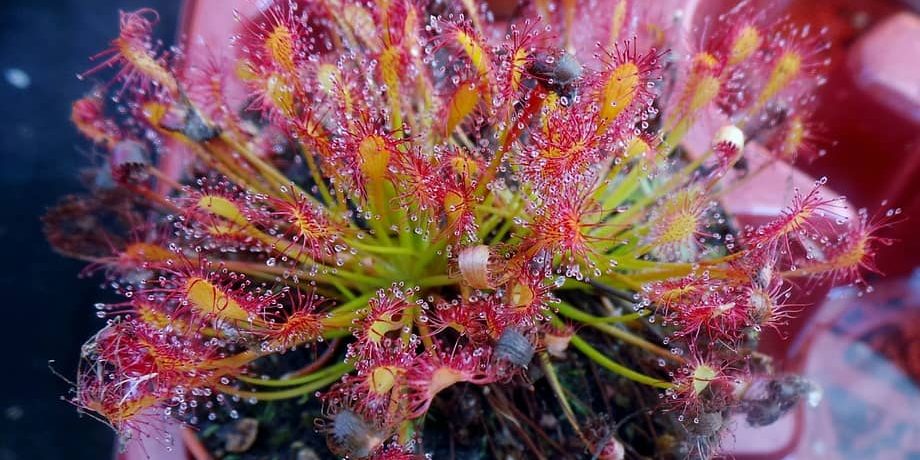Brazil is a country worldwide known for its impressive natural diversity, ranging from the Amazon to the Atlantic Forest, passing through the Cerrado and the Pantanal. Its biological richness never ceases to amaze scientists, travelers, and nature lovers. Below at BrazilGreenTravel, we will show you some of the most amazing brazil animals discovered in recent years in Brazil and that, if you visit this wonderful country, you might be lucky to see or at least learn about.
Drosera magnifica: The giant carnivorous plant
One of the most curious and modern stories about scientific discoveries takes place in Brazil, with Drosera magnifica, a carnivorous plant that might be the first plant species discovered thanks to photos posted on the social network Facebook. This species, endemic to the southeast of Brazil, lives on the summit of a mountain at 1,550 meters altitude. What makes it especially impressive is its size: it can reach up to 1.23 meters tall, being the tallest carnivorous plant of the Drosera genus in all of America.
The Drosera magnifica stands out for its sticky tentacles used to trap insects, which serve as a source of nutrients in its poor, rocky soil. Besides its scientific value, this plant is a symbol of the importance of preserving threatened ecosystems in Brazil. Unfortunately, it is considered endangered due to its extremely limited and vulnerable habitat.
Iuiuniscus iuiuensis: The tiny architect
If you are a fan of lesser-known fauna, you will love the story of Iuiuniscus iuiuensis, a small amphibious crustacean discovered in a Brazilian cave. Measuring only nine millimeters long, this creature is a true architect, building mud shelters within its underground habitat.
The isopods, the group this species belongs to, are a fascinating example of adaptation to both aquatic and terrestrial environments. Finding a new species in such a restricted and unique ecosystem as a cave is further proof of the incredible biodiversity that Brazil holds deep within.
Biodiversity of the Amazon and Atlantic Forest
Beyond these specific species, Brazil hosts the largest part of the Amazon rainforest, the largest tropical forest in the world, and a significant portion of the Atlantic Forest, ecosystems with unsurpassed biodiversity. In these regions, visitors can find impressive species such as jaguars, macaws, pink dolphins, piranhas, and hundreds of thousands of insects, plants, and microorganisms that form an invaluable ecological network.
A responsible visit to these areas allows you not only to enjoy unique landscapes, but also to support the conservation of these natural treasures.
The vital role of conservation
The species described, and many others in Brazil, face constant threats due to deforestation, illegal mining, urban expansion, and climate change. Therefore, it is crucial that as travelers and nature lovers, we become aware and support conservation and sustainable tourism projects.

How to enjoy brazilian biodiversity on your trip?
If you plan to travel to Brazil and want to deeply know its fauna and flora, I recommend some must-see experiences and destinations:
- The Pantanal: the largest tropical wetland on the planet, ideal for observing wildlife such as jaguars, caimans, anacondas, and hundreds of bird species.
- Chapada Diamantina National Park: with landscapes of mountains, waterfalls, and caves, it is home to numerous endemic species.
- The Amazon: touring the Amazon River and its tributaries with specialized guides will allow you to meet unique species and indigenous cultures.
- Botanical gardens and nature reserves in São Paulo and Rio de Janeiro: where you can learn more about local flora and the importance of its conservation.
Brazil is a destination that amazes not only for its culture and its people, but also for the astounding variety of life it harbors. From giant carnivorous plants to tiny crustaceans and unexplored underwater ecosystems, every corner of the country hides wonders to discover.
If you are a traveler passionate about nature and biodiversity, Brazil is a must-visit destination to explore, respect, and protect.








